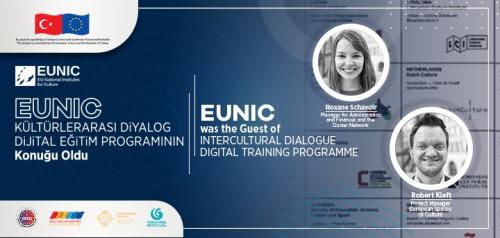EUNIC Hosted by EU-Turkey KAD Digital Training Program
Yunus Emre Institute hosted the European Union National Institutes for Culture (EUNIC) under the EU-Turkey Intercultural Dialogue (ID) Digital Training Program. Attended by the heads and employees of the cultural departments of the institute, the program discussed the role played by EUNIC not only among the members of the European Union, but also among many countries of the world for the building of cultural dialogue.
Executed under the European Union-Turkey Intercultural Dialogue Program under the leadership of Yunus Emre Institute, the Digital Training Program is going on. Representatives of the European Union National Institutes for Culture (EUNIC) were guests at the program's event on November 20, 2020.
President of Yunus Emre Institute Prof. Şeref Ateş delivered an opening speech during the program attended by the directors and employees of institutes around the world. The event was moderated by Dicle Doğancıoğlu. Roxane Schavoir and Robert Kieft attended the virtual visit as the representatives of EUNIC.
"CULTURE MAKES LIFE MEANINGFUL"
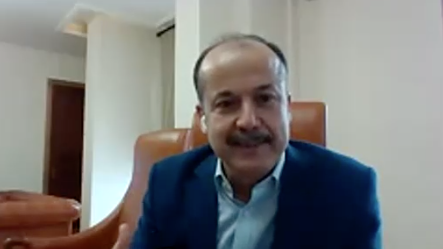
In his address, Prof. Şeref Ateş made the following remarks: "Our relation with EUNIC is especially valuable. It is very valuable that it is a structure that brings together cultural institutions in Europe. Because I always emphasize on the bridge between culture and science. Science seeks the answer to the question "how" during the lives of human beings. Culture seeks the answer to the question "why". This is why it adds meaning to our lives and therefore is very precious. Institutes and people of culture never accept the thought that culture or fine arts are not indispensable. That is why this idea of unity is very important. Our current situation reminds us of the philosophy of Yunus Emre. When Yunus goes to Haji Bektash Veli, Veli asks him "Do you want wisdom or wheat?" and Yunus accidentally wants wheat. On the one hand, wheat symbolizes material and worldly things. Breath tells the world of meaning. The tragedy we have been through for the last eight months shows our sensitivity to breathing.
According to our belief, language makes people superior to other creatures because it adds meaning to our lives and makes our lives meaningful. That is getting to know different languages means coming together with or getting to know different languages and cultures or, in other words, with different worlds of meaning. Yunus Emre's philosophy of getting to know each other stems from this thought. |
According to our belief, language makes people superior to other creatures because it adds meaning to our lives and makes our lives meaningful. That is getting to know different languages means coming together with or getting to know different languages and cultures or, in other words, with different worlds of meaning. Yunus Emre's philosophy of getting to know each other stems from this thought. He seeks unity in diversity with others. We organize cultural activities to make sense of unity in diversity. In a sense, there are strategic plans from a technical perspective. Then, there are actions. Then, there are different figures, statistics and data. But the underlying thought all this serves is important. This is to add meaning to our lives. We think that getting to know others is love. It is also getting to know others and coexisting with the opposite. An atom has a plus and minus. Likewise, plus and minus express themselves with different cultures in life. That is why the essential part of these activities is not promoting what we have. In the journey of life, the journey itself is essential. Contemporary life has also made us forget the journey itself. Because you go from point A to point B in 2 hours. Since you do not experience the journey, the world turns into a monotony and cultural differences disappear. The journey itself makes life meaningful."
LOOKING AT LIFE THROUGH ANATOLIA'S "PHILOSOPHY OF LIFE"
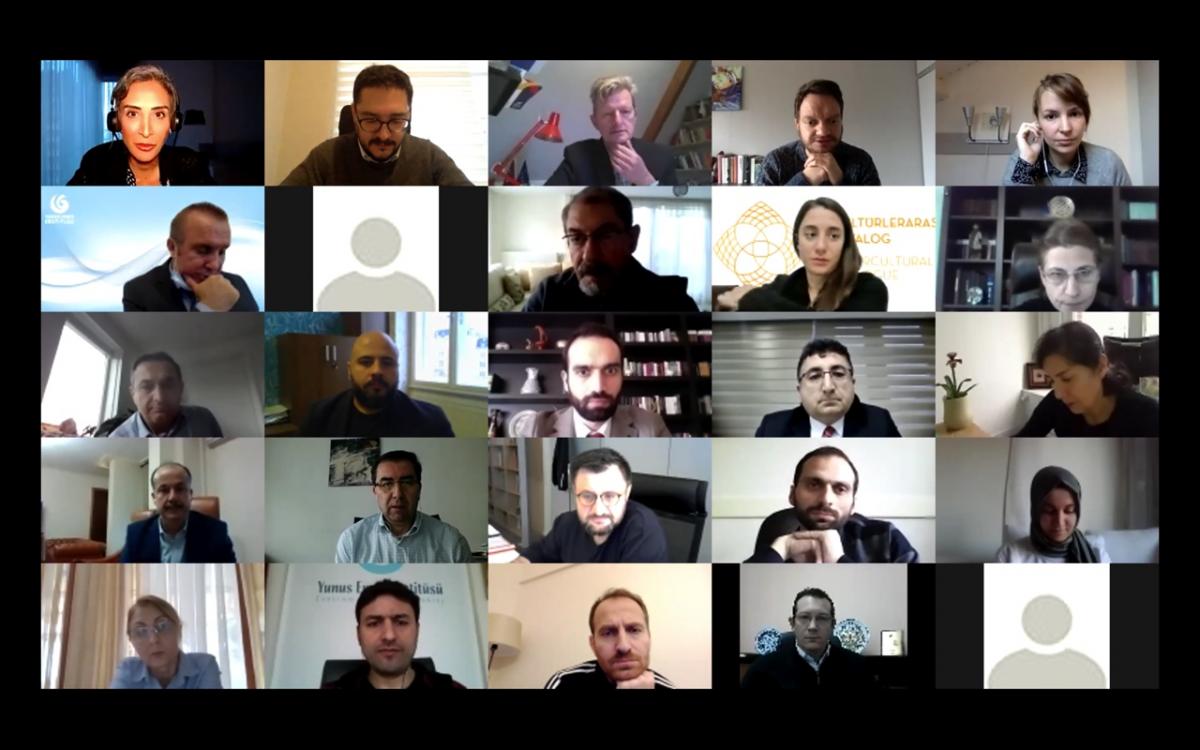
Touching upon the importance of reflecting the thought of unity rather than transferring different elements to another culture in cultural activities, Prof. Ateş went on to say:
"The basic philosophy in Anatolia is "the philosophy of life". The philosophy of life is not just humanism, it is also seeing all living things and organisms as one. Although we are different in terms of form, the kingdoms of animals and plants are the same. When they consider each other close, they can feel it. Abandon the equality or discrimination of women and men. Abandon the discrimination of race or religion. When you see others close, you should make others live so that you can live. Goal of the last century is the idea of competition. This virus has also showed this to us. We live together in the world. Everyone around the world is looking for a solution to the same problem. It is aesthetics that adds meaning to all these phenomena. What is aesthetic is also ethical, moral and inclusive."
Stating that they attached great importance to the relations of Yunus Emre Institute with both the intercultural dialogue program and EUNIC, Prof. Ateş also said:
"Because we see cultures as complementary to each other and in this sense, I greet all the directors of cultural centers and you with respect. We should not see what you are doing as corporate activities. I hope that you should not only see these activities as corporate stuff, but also feel this pleasure and excitement in humanitarian terms. I feel it. I hope we will focus on whatever is positive for humanity on this path and share it with you. What Yunus means for us is love. However, love is expressed as "falling in love" in English. Because rationalism considers love as a "falling". Because it eliminates the logic, puts the feeling forward and thus turns all orders upside down. However, establishing a bond is a rising. That is why being in love is establishing a bond and finding oneself in another person according to Yunus. That is how we see cultural activities and language work."
"WE ATTACH IMPORTANCE TO OUR RELATIONS WITH EUNIC"
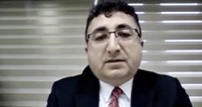
Director of the Department of Strategy Development and Corporate Communication Bülent Üçpunar said that they originally wanted to organize this event as a face-to-face event but had to organize it as a digital event due to the COVID-19 pandemic. Üçpunar said: "Improving our relationship was one of the most important objectives of the EU-Turkey Intercultural Dialogue project. Because as Turkey, we consider our relations with the European Union as very important and see culture as a very important tool in this regard. In this sense, we care about all kinds of relations with EUNIC being the umbrella organization of the European Union for cultural institutes. Our cultural centers in the European Union and other countries try to participate in EUNIC activities through these clusters or independently. In this regard, we have intensive cooperation. We want to develop this further. A digital event was really good for us in one sense. Videos were produced as a result of these virtual visits, which turned into an intellectual output for the project. A very limited number of directors would have attended face-to-face visits, and we would not have the opportunity to record this in a proper way. This was one of the unpredicted aspects of this project."
Üçpunar stated that they would be able to host EUNIC directors in European centers after the pandemic. Stating that they had a large number of personnel, directors and employees from candidate countries for the European Union, Üçpunar went on to say: "Representatives from our centers in European Union member states such as the Netherlands, Spain, the UK, Belgium, Austria, Germany, Poland, Hungary, Romania, France, Croatia and Italy as well as candidate countries such as Bosnia and Herzegovina, Serbia, North Macedonia and Montenegro are also with us. I wish this meeting will be an occasion to further develop our relations with EUNIC. I would like to express that we are pleased to host Mr. Robert and Ms. Roxan here."
EUNIC GATHERS MINISTRIES, INSTITUTES AND CULTURAL CENTERS UNDER ONE ROOF
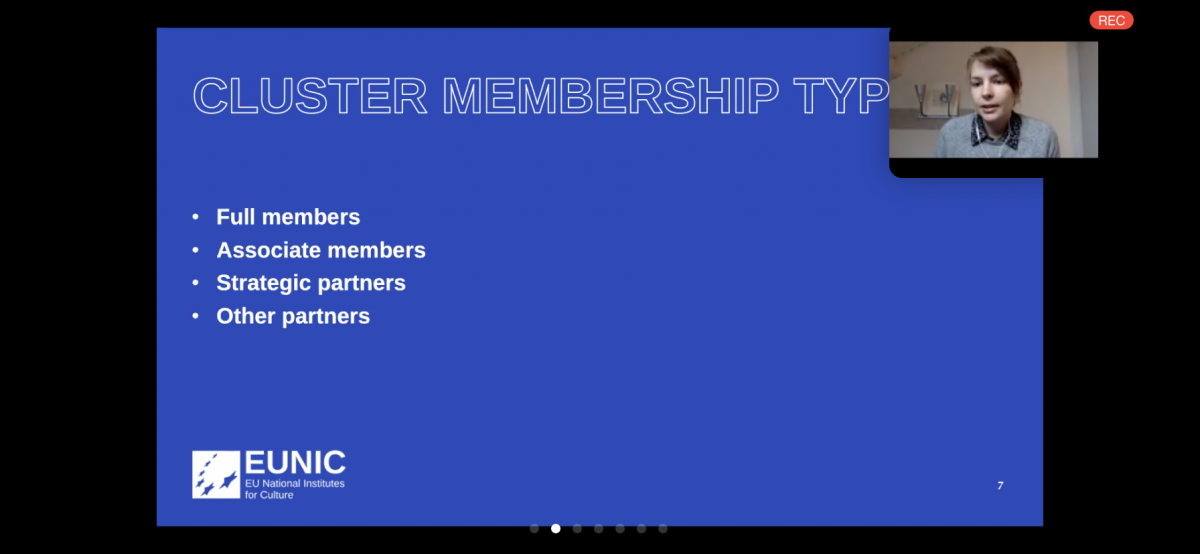
The representative of EUNIC Roxane Schavoir firstly informed the participants on the aims and functions of EUNIC regarding intercultural dialogue in her presentation. Schavoir said that the members of EUNIC with 36 member countries from the European Union and other countries included cultural centers, institutes, the ministries of foreign affairs and the ministries of "culture, education, science and sport". Introducing the organization's management chart, Schavoir stated that EUNIC had different forms of membership.
EUNIC has collaboration platforms called clusters, managed by members ranging in number from 3 to 20. These clusters can be organized at national level or at a city level. |
EUNIC has collaboration platforms called clusters, managed by members ranging in number from 3 to 20. These clusters can be organized at national level or at a city level. In her presentation, Schavoir indicated that EUNIC had 125 clusters in 90 countries. Schavoir stated that the events organized by clusters are funded by the Cluster Fund.
INNOVATIVE COLLABORATIONS WITH EU MEMBER STATES AND OTHER COUNTRIES
 Robert Kieft talked about the aims of EUNIC in his presentation titled "Bringing Cultural Relations to the Next Level". He said that they were trying to implement innovative cooperation models with the EU, EU member states and non-EU partners. Stating that they developed EU approaches in cultural relations in line with EU strategies, Kieft noted that he made policy and implementation recommendations on this issue. Kieft also underlined the importance of developing models for monitoring and evaluating cultural relations.
Robert Kieft talked about the aims of EUNIC in his presentation titled "Bringing Cultural Relations to the Next Level". He said that they were trying to implement innovative cooperation models with the EU, EU member states and non-EU partners. Stating that they developed EU approaches in cultural relations in line with EU strategies, Kieft noted that he made policy and implementation recommendations on this issue. Kieft also underlined the importance of developing models for monitoring and evaluating cultural relations.
Following the presentations, the directors and employees of Yunus Emre Institute asked questions to the representatives from EUNIC.
EUNIC PROJECTS ARE BASED ON MUTUAL ADDED VALUE
Working as an Expert at Yunus Emre Institute, Nurullah Yavaş asked: "How does EUNIC work with the institutions of EU member states as an umbrella institution and independently from the positions of its members? What are the attitudes and principles of EUNIC on this issue?". Robert Kieft answered this question as follows:
“Officially, EUNIC is a network of 38 members. However, what we do around the world is performed at the level of cluster, country or city. Members cooperate not only among themselves but also with other European countries, neighboring members or non-EU member countries. Other European countries also have cultural representatives at the level of embassy or cultural institute. Most of these clusters have strong relations with countries. As EUNIC Global, we do not have any agenda or strategy to work with cultural centers, cultural attaches or embassies of non-EU member countries. We think that it depends on the local context.” Stressing how interesting and meaningful the projects were for the countries with which they cooperated, Kieft emphasized that they took into consideration the clusters where for instance Yunus Emre Institute was included as well as the added value created and to be created by these clusters for Yunus Emre Institute under these projects.
FUNDING OF CLUSTERS AND DIGITAL TRANSFORMATION MUST BE ENCOURAGED MORE
More work is needed on digital transformation and more funding is required for clusters to implement larger projects. |
Director of Rome Cultural Center Sevim Aktaş said: "As Rome Yunus Emre Institute, we have been a member of EUNIC since 2017. But we previously made some collaborations. We are not a full member but an associate member. I am telling this based on a determination made during a meeting we have recently organized with EUNIC. The main problem of the clusters working locally as well as of the institutes is the failure to implement large projects. Because such projects require substantial financial resources. The current situation seems to be extended and digital events are more probable throughout the next year. Now, I would like to ask a question. Do you have any strategy for organizing joint digital events with EUNIC Clusters for this new period we are going through? Secondly, education is another area all cultural institutes are dealing with throughout this process. Does EUNIC Global have any digital platform or artificial intelligence project that can be used by all EUNIC members especially regarding language courses in their agenda or any recommendation in this regard?
Roxane Schavoir stated that they held meetings on digital projects and wanted to share their results.
Schavoir said that EUNIC Global did not yet have any overall digital strategy, but clusters were working in this direction. Schavoir stated that they encouraged clusters to support local partners in terms of the funding of clusters, especially due to the currency crisis. Stating that there would be more digital events during this period due to the COVID-19 pandemic, Schavoir said that many organizations also developed hybrid projects. Schavoir also indicated that they needed to think more about how to overcome these difficulties and focus on projects.
In response to Sevim Aktaş's question, Robert Kieft said that as EUNIC Global, they were that many clusters were engaged in digital activities and that they discussed the impact of digital transformation on cultural relations and language education for four days.
Kieft stated that they did not yet have any project on digital language education, but many clusters were working on this issue and they were trying to bring clusters together on virtual information-exchange platforms. Kieft noted that digital transformation was something new for everyone and they were working on it.
CLUSTERS BRING TOGETHER PROJECT STAKEHOLDERS ON COMMON THEMES AND STRATEGIES
Director of Pristina Yunus Emre Institute Mehmet Ülker informed EUNIC representatives about the activities of Yunus Emre Institute and asked the following question:
“As Yunus Emre Institute, we organize various events with participants from different parts of the world under the title of thematic summer school. These include "Turkey In the World Cultural Heritage - Archeology Summer School" aiming to better promote the cultural heritage of Turkey; "Turkish Cinema Summer School" aiming to share Turkey's cinematic history with the entire world and present a deeper insight into Turkish cinema and "Turkish Literature Summer School" aiming to present a deeper insight into Turkish literature. These events include rich content such as seminars, workshops, movie and documentary screenings, historical and touristic visits. We consider that these activities directly consort with EU values such as the creation of new ideas, cooperation and networking. These events are highly admired and considered as high-quality events by the participants. What kind of initiatives do you take to combine the experiences of Yunus Emre Institute on this subject with the experiences of EU institutions and citizens by creating a formal and informal network and to enable them to benefit more from these activities?"
In response to Ülker's question, Schavoir stated that Yunus Emre Institute had significant experience regarding cultural events and said that cooperation with EUNIC needed to be increased. Stating that for this reason, more contact needed to be established with the clusters including Yunus Emre Institute and there could be difficulties in setting strategic priorities more clearly, Schavoir noted that they looked for more partners regarding their projects. Supplementing the remarks of Schavoir with concrete examples, Robert Kieft underlined that a Turkish author could be invited to a European Literature Night and this was also the case for movie festivals. Kieft stressed that although these events were traditional projects, they offered opportunities for other institutes to get involved.

